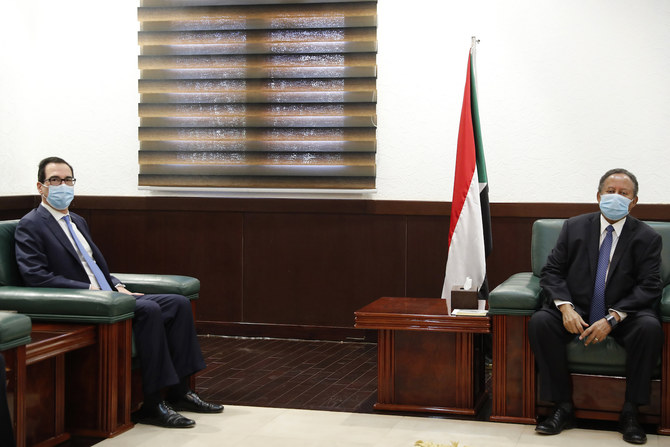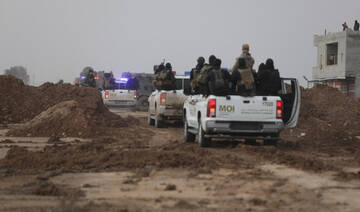CAIRO: Sudan on Wednesday said it signed the “Abraham Accords” with the US, paving the way for the African country to normalize ties with Israel.
A statement from the office of Sudan’s prime minister said Justice Minister Nasredeen Abdulbari signed the accord Wednesday with visiting US Treasury Secretary Steven Mnuchin.
The recent US-negotiated deals between Arab countries and Israel have been a major foreign policy achievement by President Donald Trump's administration. The deals were named the “Abraham Accords” after the biblical patriarch revered by Muslims and Jews.
The signing came just over two months after Trump announced that Sudan would start to normalize ties with Israel.
Before Sudan, the Trump administration engineered diplomatic pacts late last year between Israel and the United Arab Emirates and Bahrain — the first since Jordan recognized Israel in the 1990s and Egypt in the 1970s. Morocco also established diplomatic ties with Israel.
The US and Sudan on Wednesday agreed to settle the African’s country’s debt to the World Bank, widely seen as a key step toward the nation’s economic recovery after the 2019 overthrow of longtime autocrat Omar Al-Bashir.
The move came during Treasury Secretary Steven Mnuchin's visit to Khartoum, making him the first senior American official to land there since President Donald Trump’s administration removed the African country from the list of state sponsors of terrorism.
Mnuchin arrived at Khartoum’s international airport, where he received by acting Finance Minister Heba Mohammed Ali, and US Charge d’Affaires in Sudan Brian Shukan, the prime minister's office said in a statement.
It is the first visit by a sitting US treasury chief to Sudan, the statement said. Secretary of State Mike Pompeo in August became the first top American diplomat to visit Sudan since 2005, when Condoleezza Rice visited. Pompeo was also the most senior US official to visit the African country since last year’s ouster of Al-Bashir.
Mnuchin's visit came after a one-day-visit to Cairo, where he met with Egypt’s President Abdel-Fattah El-Sisi, a close US ally. The stops are part of a flurry of activity during the final days of the Trump administration. Democrat Joe Biden becomes president on Jan. 20.
The US treasury secretary met with Prime Minister Abdalla Hamdok, and is scheduled to meet with other Sudanese leaders including Gen. Abdel-Fattah Burhan, head of the ruling sovereign council.
The visit came “at a time when our bilateral relations are taking historical leaps towards a better future. We’re planning to make tangible strides today as our relations enter a #NewEra,” Hamdok tweeted.
Mnuchin’s one-day visit focused on the country’s struggling economy and possible US economic assistance, including debt relief, the statement said. Sudan today has more than $60 billion in foreign debt. Relief from its arrears and access to foreign loans are widely seen as its gateway to economic recovery.
Sudan’s Finance Ministry said it inked a “memorandum of understanding” with the US treasury department to to facilitate the payment of Sudan’s arrears to the World Bank.
The ministry said the settlement would enable Sudan's government to have more than $1 billion annually from the World Bank, for the fist time since nearly three decades when Sudan was designated as pariah state. It did not provide further details.
The Justice Ministry, however, announced last month that the US would play a $1 billion bridge loan to the World Bank to help clear Sudan’s arrears with the institution, in addition to $1.1 billion direct and indirect aid from the US.
Sudan is on a fragile path to democracy after a popular uprising led the military to overthrow al-Bashir in April 2019. The county is now ruled by a joint military and civilian government that seeks better ties with Washington and the West.
The government has been struggling with a huge budget deficit and widespread shortages of essential goods, including fuel, bread and medicine.
Annual inflation soared past 200% in the past months as prices of bread and other staples surged, according to official figures.
Last month, Trump’s administration finalized the removal of Sudan from the US list of state sponsors of terrorism. The move was a key incentive for the government in Khartoum to normalize relations with Israel.
The two countries, Sudan and Israel, have agreed to have full diplomatic ties, making Sudan the third Arab state — after the United Arab Emirates and Bahrain — to move to normalize relations with Israel late last year. Morocco also established diplomatic ties with Israel.
Sudan’s economy has suffered from decades of US sanctions and mismanagement under Al-Bashir, who had ruled the country since 1989.
The designation dates back to the 1990s, when Sudan briefly hosted Al-Qaeda leader Osama bin Laden and other wanted militants. Sudan was also believed to have served as a pipeline for Iran to supply weapons to Palestinian militants in the Gaza Strip.
Mnuchin’s visit came amid rising tensions between military and civilian members of Sudan’s transitional government. That tensions, which resurfaced in recent weeks, have largely centered on the Sudanese military’s economic assets, over which the civilian-run finance ministry does not have control.
John Prendergast, co-founder of The Sentry watchdog group, urged The US treasury secretary to pressure the military and security apparatus to allow “independent oversight” to businesses they control.
“As Secretary Mnuchin engages with the leadership in Khartoum, it is critical that he weighs in with strong support for international anti-money laundering standards and fiscal transparency, which are essential for Sudan to counter the looting of its national economy,” he said.
Sudan says it signed ‘Abraham Accords’ with US
https://arab.news/zyzam
Sudan says it signed ‘Abraham Accords’ with US

- The signing came just over two months after Trump announced that Sudan would normalize ties with Israel
- The US and Sudan agreed to settle the African’s country’s debt to the World Bank, widely seen as a key step toward the nation’s economic recovery
Flash floods in Syria kill 1 volunteer, trap civilians and block roads

- Five volunteers suffered moderate to severe injuries, including one who was injured while attempting to rescue a child trapped in floodwaters
LONDON: Flash floods caused by heavy rainfall in northern and western Syria have resulted in the death of a volunteer with the Syrian Arab Red Crescent and have injured several others during rescue operations in the Latakia countryside on Sunday.
Volunteer Samiha Rakhamieh was killed when her vehicle slid into a valley in Jabal Al-Turkman while responding to flood emergencies. Five volunteers suffered moderate to severe injuries, including one who was injured while attempting to rescue a child trapped in floodwaters, according to the Syrian Arab News Agency.
On Saturday, two children lost their lives, and a third was rescued after severe flooding swept through the Ain Issa area in the northern Latakia countryside.
Heavy rains in northern and western Syria have caused flash floods, inundating tents in camps near Idlib and prompting emergency evacuations. Flooding in the Latakia countryside has trapped civilians and blocked roads, authorities reported.
















